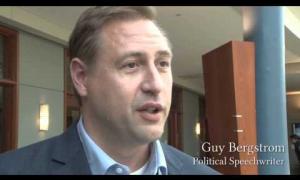What do speechwriters want?
April 17, 2017
Professional speechwriters want what’s best for their speakers—and what’s best for the audience, too. Behold the Grand Award winner of the 2017 Cicero Speechwriting Awards.
All professional speechwriters want to help their client find the best words to express the client’s best ideas. Some professional speechwriters want to do more than that.
They want their clients to say something unexpected and bold.
They want their clients to connect their messages with their own humanity through personal stories.
They want their clients to use their powerful position to exert influence beyond their organization or industry, into the larger society.
Today marks an annual celebration of this little-celebrated profession: the unveiling of the winners of the 2017 Cicero Speechwriting Awards.
It’s the celebration of speechwriters who want more than to please their client—speechwriters who want to help their client change the world.
Many of the 23 speeches that won Cicero Speechwriting Awards this year showed such ambition, as you can see from the titles in the free downloadable collection of winning speeches, “These Vital Speeches.”
You see Marathon Petroleum Corp.’s CEO Gary R. Heminger and his speechwriter Jamal Kheiry leave the parochial concerns of the energy industry by giving a speech on “Accepting the Premise That Every Single Man, Woman and Child Is Infinitely Valuable.” You see the Netherlands Chief of Defense Tom Middendorp exceed his military pay grade with the help of his speechwriter Antonie van Campen to discuss “The Pursuit of Global Justice.” You see AARP CEO Jo Ann Jenkins and her speechwriter Boe Workman break the surly bonds of Social Security and Medicare policy in a speech called, “Disrupt Aging.”
And most profoundly, you see the (now former) Director of National Intelligence, James Clapper, and his speechwriter Trey Brown, win the 2017 Cicero Grand Award with a speech titled, “Why Black Lives Matter to U.S. Intelligence.”
For speechwriters who want to do great work, and leaders who are up to the highest rhetorical purposes, this speech rings all the bells.
It begins with three words that even the audience for the speech, the students of historically black Morehouse College, must have found surprising, coming out of the mouth of the custodian of one of the most conservative and culturally homogenous (not to say whitest) of American institutions: “Black lives matter.”
But what does that have to do, exactly, with American intelligence? Clapper begins to answer that question with an elaborate and well-told story of his own upbringing, in a military family in an earlier time, when black officers were discouraged from mixing with white officers. He relates a childhood memory of an officer’s club brunch where a band was playing. “I recognized my dentist. He was an Army first lieutenant, a junior officer much like my dad. … My family had a prime table near the band, but because he was black, my dentist sat by himself on the perimeter of the room. So when the music stopped, my mom—and I think she picked that point on purpose—stood up. A few people looked at her. She rather ostentatiously walked over to our dentist’s table. By this time, the whole room was looking at her. She talked with him for a minute or two, and then invited him to sit with us, took him by the hand, and just as ostentatiously led him to our table. As they walked to our table, all those colonels and lieutenant colonels, the senior officers, stopped looking at her and started staring at my dad, with that unspoken look of, ‘Can’t you get your wife under control?’ I’ll never forget, my dad’s expression was a mixture of amusement, admiration—and fear.”
After telling a number of other stories further establishing the skin he has in the intelligence game as well as the diversity game, Clapper makes the case for a need for diversity in the intelligence community. “It’s hard to get a diversity of ideas from a room full of old, white, straight, cisgender men, who all look like me and who have similar life experiences,” he says, before reporting that the intelligence community’s diversity record is “not pretty, and we’ve drawn some scrutiny because of that.”
Clapper continues, “I don’t fully understand why our IC diversity lags so far behind the corporate world, although I suspect it has something to do with that phrase I opened with 20 minutes ago—black lives matter. If you feel as a community that you have to defend the fact that your lives matter, then I can understand not wanting to participate in the institutions you feel do not value your lives, particularly ones known for keeping secrets, which we are. Before this spring, we wouldn’t even say how many minorities we employed.”
And Clapper concludes with a a call to action: a plea for predominantly African American audience to “at least consider joining the U.S. Intelligence Community.”
Clapper’s speechwriter Trey Brown helped his boss reach a new audience with a message that must have surprised them with its candor and humanity, to make the kind of personal connection that only a speech can—and that, if the best speechwriters had their way, more speeches would.
Here’s to Trey Brown and to James Clapper and to all the speechwriters who want to achieve more with rhetoric, and the leaders who are up to the challenge. Here’s to the winners of the 2017 Cicero Speechwriting Awards.



